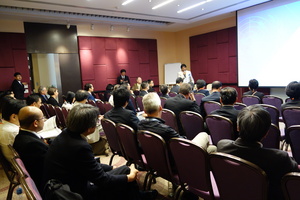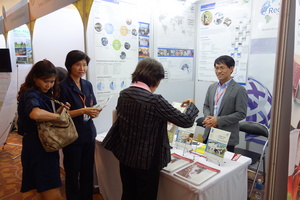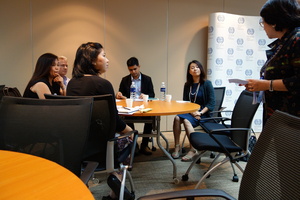22-27 June 2014 (Bangkok, Thailand)
 On occasion of the Sixth Asian Ministerial Conference on Disaster Risk Reduction (6AMCDRR), a biennial conference in Asia to ensure political and stakeholder's commitment towards disaster risk reduction implementation, the International Recovery Platform (IRP) organized a side event
On occasion of the Sixth Asian Ministerial Conference on Disaster Risk Reduction (6AMCDRR), a biennial conference in Asia to ensure political and stakeholder's commitment towards disaster risk reduction implementation, the International Recovery Platform (IRP) organized a side event
"Investing in Recovery for Resilience: Articulating Recovery in HFA2" was organized on June 24, 2014 at Lotus 4, Bangkok Convention Center at Centara Grand. Following the opening and special remarks by Mr. Kaoru Saito, Director of Cabinet Office, Japan, with panelists coming from diverse backgrounds, including Atty. Violeta Seva of Makati City (Philippines), Prof. Santosh Kumar of SAARC Disaster Management Center (SDMC), Mr. Tadao Hasue and Ms. Kumi Onuma of Development Bank of Japan (DBJ), and Ms. Ana Cristina Thorlund of International Recovery Platform (IRP), past experiences were highlighted to draw insights. The moderator Mr. Saber Hossain Chowdhury, Member of Parliament Bangladesh, raised the broad question: What will be the critical recommendations to adequately articulate recovery in HFA2?
After consolidating all the inputs from speakers and audience, the side event came up with the following key recommendations:
- Institutionalizing recovery functions in national and local governance systems
- Ensuring financial predictability for recovery programs and activities
- Strengthening coordination of recovery actors as well as considering the trans- boundary nature of recovery
- Recognizing human security as an essential foundation for effective recovery
- Developing concrete and measurable indicators to monitor progress of implementation and achievement of recovery goals
In view of these recommendations, it was suggested that the future role of IRP may consider acting as a global mechanism for cooperation in the areas of recovery. Its task may include providing technical support on recovery for subnational governments, contributing to achieve sustainable development goals (SDGs), offering technical support on recovery from technological disasters or conflicts, and ensuring seamless integration of recovery in with development plans.
Three key conclusions were reached at the end of the session. Firstly, recovery should be adequately articulated in HFA2 so that governments can have general guidance in implementing recovery programs. Secondly, recovery (seen as an opportunity to build back better) must also be aligned with the sustainable development goals. Finally, recovery needs further advocacy at the policy and legislative levels to outline clear measures for monitoring progress as well clear roles of government departments and units in implementing recovery programs.
The event was concluded successfully with the closing remarks by Mr. Kiyoshi Natori, Executive Director of ADRC.
The IRP booth showcased various knowledge products including Guidance Notes on  Recovery, newsletters, thematic reports, brochures, and materials on recovery from IRP partners. In addition, the works and activities of IRP are presented in attractive posters that caught the attention of many delegates at the conference. the Secretariat pursued wider dissemination of IRP products and services as well as building and strengthening partnerships.
Recovery, newsletters, thematic reports, brochures, and materials on recovery from IRP partners. In addition, the works and activities of IRP are presented in attractive posters that caught the attention of many delegates at the conference. the Secretariat pursued wider dissemination of IRP products and services as well as building and strengthening partnerships.
Following the 6AMCDRR, the IRP Secretariat participated in the workshop on "Job-rich Recovery after Natural Disasters: Lessons from the Great East Japan Earthquake" organized by ILO Asia-Pacific Office on 27 June 2014 at the United Nations Convention Center in Bangkok.
The objectives of the workshop included raising awareness of the relevance of employment and social protection policies in the contexts of disaster risk prevention and post-disaster reconstruction; sharing experiences, lessons, and good practices generated from the reconstruction process in Japan since the 2011 Great East Japan Earthquake; and identifying strategies for further enhancing knowledge on job-rich disaster risk prevention and reconstruction practice in Asia and the Pacific. The participants who attended the workshop were experts and practitioners in employment policy, social protection, and disaster risk management from selected governments, humanitarian, and development assistance organizations in Asia and the Pacific.
reconstruction practice in Asia and the Pacific. The participants who attended the workshop were experts and practitioners in employment policy, social protection, and disaster risk management from selected governments, humanitarian, and development assistance organizations in Asia and the Pacific.

